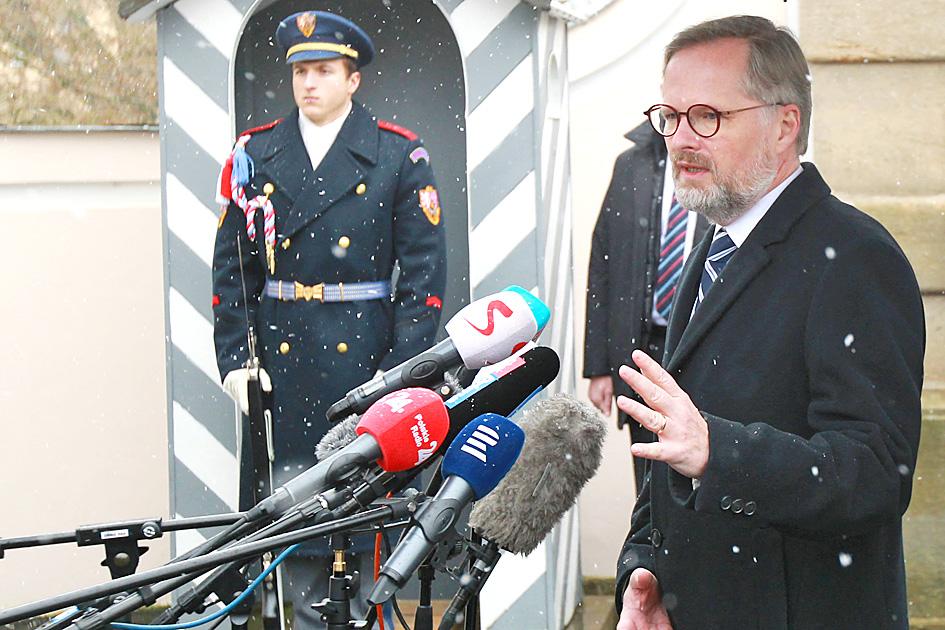Czech Prime Minister Petr Fiala on Thursday approved his government’s four-year administrative plan, which includes measures to bolster partnerships with Taiwan, as well as other democracies in East Asia.
The 52-page plan, which was published online on Friday, covers the Czech government’s financial, social and diplomatic policies for the next four years, including plans for strengthening the Czech Republic’s relationships with Taiwan, India, Japan and South Korea.
The plan also calls for a reassessment of the country’s relationships with China and Russia.

Photo: AFP
The plan reflects a continuation of former prime minister Vaclav Havel’s foreign affairs policies, which largely focused on strengthening partnerships with fellow democracies.
Apart from Asia, the plan also names Germany, Israel, the UK and the US as important democratic partners with which to cooperate on safeguarding democracy, human rights and civil society, which it describes as “not only a moral obligation,” but also a course of action that benefits the country.
In Taipei, the Ministry of Foreign Affairs on Saturday said that it welcomes the Czech Republic’s policies on the region, adding that it looks forward to further deepening ties with the European country.
Taiwan welcomes further development of the two nations’ mutually beneficial relationship, as well as cooperation with the Czech Republic on safeguarding democracy, the ministry said.
The Czech Republic’s successes in transitional justice and the protection of human rights have ensured its place within European politics, it added.
Next year, the Czech government is expected to pass its own version of the US’ Magnitsky Act, which seeks to punish the Russian officials responsible for the death of Russian lawyer Sergei Magnitsky, who was killed in 2009 while incarcerated in a Moscow prison.
Media reports in Slovakia quoted Central European Institute of Asian Studies executive director Matej Simalcik as saying that systematic conflicts between democratic nations and authoritarian states are likely to grow increasingly common.
This would threaten the rules-based international order, he said, adding that bolstered Taiwan-Slovakia ties would have a special significance in this context.
A 43-member Slovak delegation led by the country’s deputy economics minister visited Taiwan early last month, prompting Beijing to lambast Slovak officials.
Despite increased pressure on Slovakia from China, the Slovak government is pragmatically working with Taiwan, Simalcik was quoted as saying, adding that in the face of economic considerations, Slovakia has not forgotten about safeguarding the international order.

Taiwan has received more than US$70 million in royalties as of the end of last year from developing the F-16V jet as countries worldwide purchase or upgrade to this popular model, government and military officials said on Saturday. Taiwan funded the development of the F-16V jet and ended up the sole investor as other countries withdrew from the program. Now the F-16V is increasingly popular and countries must pay Taiwan a percentage in royalties when they purchase new F-16V aircraft or upgrade older F-16 models. The next five years are expected to be the peak for these royalties, with Taiwan potentially earning

STAY IN YOUR LANE: As the US and Israel attack Iran, the ministry has warned China not to overstep by including Taiwanese citizens in its evacuation orders The Ministry of Foreign Affairs (MOFA) yesterday rebuked a statement by China’s embassy in Israel that it would evacuate Taiwanese holders of Chinese travel documents from Israel amid the latter’s escalating conflict with Iran. Tensions have risen across the Middle East in the wake of US and Israeli airstrikes on Iran beginning Saturday. China subsequently issued an evacuation notice for its citizens. In a news release, the Chinese embassy in Israel said holders of “Taiwan compatriot permits (台胞證)” issued to Taiwanese nationals by Chinese authorities for travel to China — could register for evacuation to Egypt. In Taipei, the ministry yesterday said Taiwan

Taiwan is awaiting official notification from the US regarding the status of the Agreement on Reciprocal Trade (ART) after the US Supreme Court ruled US President Donald Trump's global tariffs unconstitutional. Speaking to reporters before a legislative hearing today, Premier Cho Jung-tai (卓榮泰) said that Taiwan's negotiation team remains focused on ensuring that the bilateral trade deal remains intact despite the legal challenge to Trump's tariff policy. "The US has pledged to notify its trade partners once the subsequent administrative and legal processes are finalized, and that certainly includes Taiwan," Cho said when asked about opposition parties’ doubts that the ART was

If China chose to invade Taiwan tomorrow, it would only have to sever three undersea fiber-optic cable clusters to cause a data blackout, Jason Hsu (許毓仁), a senior fellow at the Hudson Institute and former Chinese Nationalist Party (KMT) legislator, told a US security panel yesterday. In a Taiwan contingency, cable disruption would be one of the earliest preinvasion actions and the signal that escalation had begun, he said, adding that Taiwan’s current cable repair capabilities are insufficient. The US-China Economic and Security Review Commission (USCC) yesterday held a hearing on US-China Competition Under the Sea, with Hsu speaking on